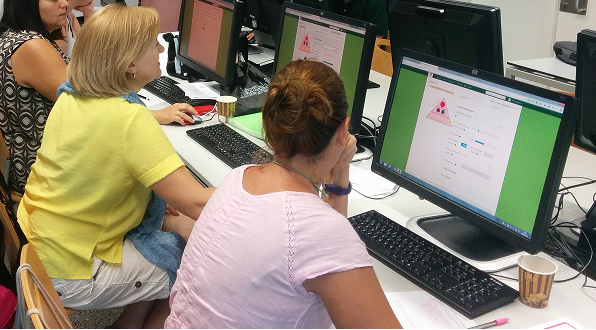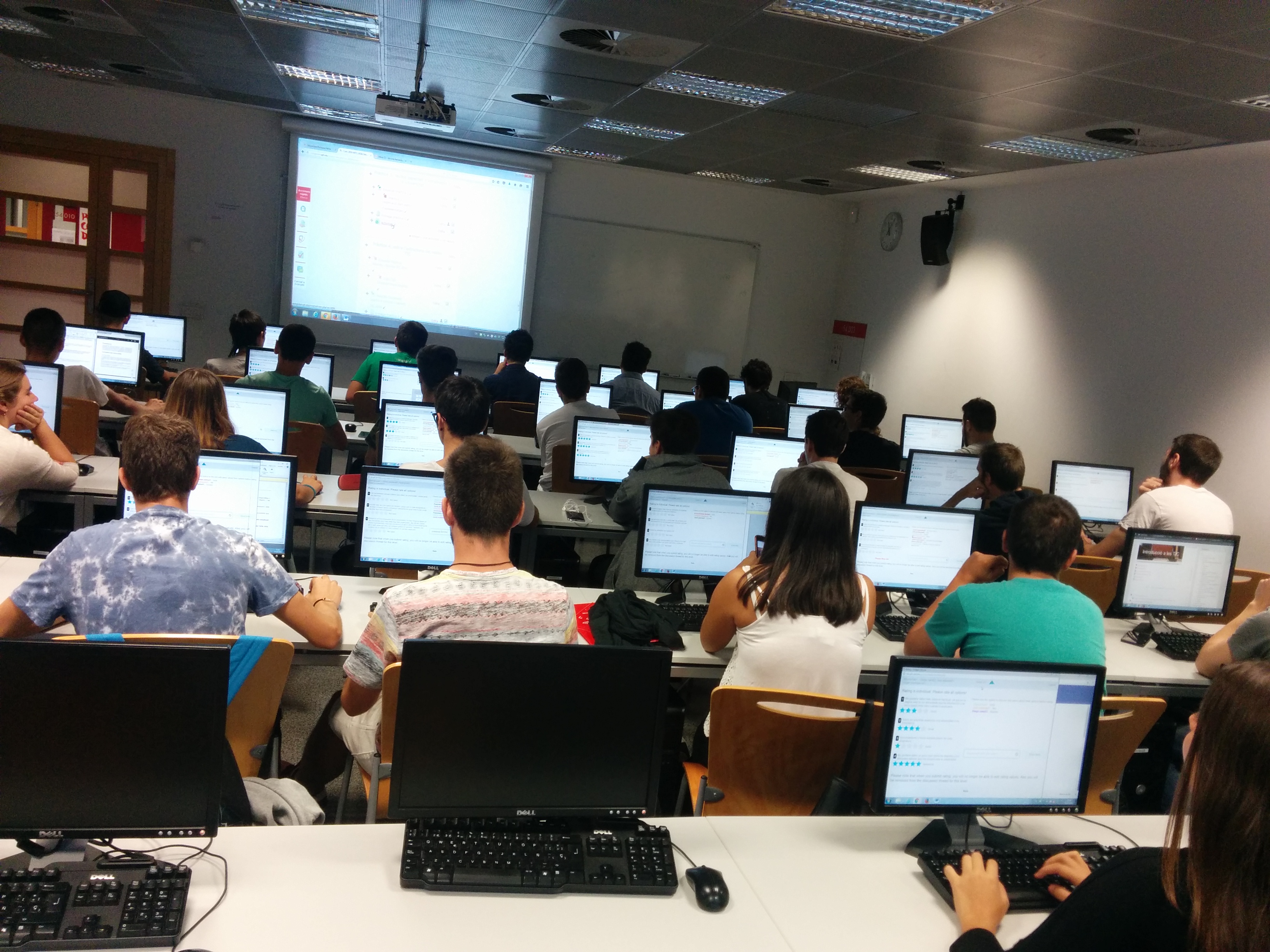PyramidApp
PyramidApp
PyramidApp
A scalable approach facilitating flexible collaborative learning, based on the Pyramid or Snowball collaborative learning flow pattern
PyramidApp is a scalable technological approach facilitating flexible collaborative learning following Pyramid or Snowball collaborative learning flow pattern.
Using PyramidApp authoring tool, practitioners can design activities that can be enacted in any preferred education context. Students will use PyramidApp to access the activity and submit individual option (which can be a question, comment, suggestion, or even a link of a created resource) for a given task. Students will be able to collaboratively discuss and negotiate upon a common agreed option in groups and rate those options iteratively following a snowball or pyramid structure till the complete crowd reaches a global consensus on the most interesting option(s).

The objective of the tool is to allow students to learn from peers in the process of proposing options, discussing and selecting the best option(s)! Practitioners are able to monitor on-going pyramid activities and view the winning options in order to discuss further.

How it works
Authoring:
Activity enactment:
Create Pyramids & Enact!
PyramidApp is integrated within ILDE platform.
- If you have an account to ILDE, simply go to
- New design (in the main menu) -> Author -> PyramidApp.
- Here you can design Pyramid activities by specifying preferred parameters.
- Click "Save & Exit" button to save your design.
- In the next screen click "Publish this document" button to publish your Pyramid activity.
- Once you publish your design in ILDE, you will get a “public link“.
- Using this public link, students can access the activity, using smartphones or Google chrome web browser.
Here you can find a user manual explaining these authoring aspects of the PyramidApp.
More information: https://pyramidappupf.wordpress.com
Main publications about the tool:
Manathunga, K., Hernández-Leo (2018), Authoring and enactment ofmobile pyramid-based collaborative learning activities, British Journal of Educational Technology, 49(2),262–275, doi:10.1111/bjet.12588, open access at https://repositori.upf.edu/handle/10230/33322
Amarasinghe, I., Hernández-Leo, D., Michos, K., & Vujovic, M. (2020). An Actionable Orchestration Dashboard to Enhance Collaboration in the Classroom. IEEE Transactions on Learning Technologies, 13(4), 662-675.
Theophilou, E., Sanchez-Reina, R., Hernandez-Leo, D., Odakura, V., Amarasinghe, I., Lobo, R., (2023) The effect of a group awareness tool in synchronous online discussions: studying participation, quality and balance, Behaviour & Information Technology.
Studies using PyramidApp and about specific tool features (complete list here):
-
Amarasinghe, I., Michos, K., Crespi, F., & Hernández-Leo, D. (2022). Learning analytics support to teachers’ design and orchestrating tasks, Journal of Computer Assisted Learning, Online version of record available before inclusion in an issue, 1-16. https://doi.org/10.1111/jcal.12711
-
Odakura, V., Amarasinghe, I., Hernández-Leo, D., Sánchez-Reina, R., Theophilou, E., & Lobo-Quintero, R. (2022, October). Effects of Debriefing in Computer-Supported Collaborative Learning Pyramid Scripts with Open-Ended Task. In Collaboration Technologies and Social Computing: 28th International Conference, CollabTech 2022, Santiago, Chile, November 8–11, 2022, Proceedings (pp. 23-37). Cham: Springer International Publishing.
-
Amarasinghe, I., Hernández Leo, D., Manathunga, K., Chacón Pérez, J., & Dimitriadis, Y. (2022). Teacher-led debriefing in computer-supported collaborative learning pyramid scripts. In 15th International Conference on Computer-Supported Collaborative Learning (CSCL) 2022; 2022 Jun 6-10; Hiroshima, Japan. Hiroshima: International Society of the Learning Sciences; 2022. International Society of the Learning Sciences.
-
Velamazán, M., Santos Rodríguez, P., Hernández Leo, D., & Amarasinghe, I. (2022). Student preferences and behaviour in anonymous collaborative learning. In 15th International Conference on Computer-Supported Collaborative Learning (CSCL) 2022; 2022 Jun 6-10; Hiroshima, Japan. Hiroshima: International Society of the Learning Sciences; 2022.. International Society of the Learning Sciences.
-
Amarasinghe, I., Hernández-Leo, D. & Hoppe, U. (2021) Deconstructing orchestration load: comparing teacher support through mirroring and guiding. Intern. J. Comput.-Support. Collab. Learn 16, pp. 307–338 (2021). https://doi.org/10.1007/s11412-021-09351-9
-
Amarasinghe, I., Hernández-Leo, D., Theophilou, E., Sanchez-Reina, R., Lobo, R., (2021) Learning gains in Pyramid computer-supported collaboration scripts: factors and implications for design, CollabTech Conference, August, , Germany/Virtual, Part of the Lecture Notes in Computer Science book series (LNCS, volume 12856), pp. 35-50.
-
Hakami, E., Hernández-Leo, D., Amarasinghe, I., (2021) Understanding the well-being impact of a computer-supported collaborative learning tool: the case of Pyramid App, European Conference on Technology-Enhanced Learning, pp, Springer LNCS, pp. 373-37.
- Manathunga, K., Hernández-Leo, D. (2019). Flexible CSCL Orchestration Technology: Mechanisms for Elasticity and Dynamism in Pyramid Script Flows, International Conference on Computer Supported Collaborative Learning, Lyon, France.
- Manathunga, K., Hernández-Leo, D., PyramidApp: Scalable method Enabling Collaboration in the Classroom. In: Proceedings of 11th European Conference on Technology Enhanced Learning, EC-TEL 2016, Lyon, France, September 2016, LNCS 9891, 422- 427.
- Manathunga, K., Hernández-Leo, D., Sharples, M., (2017) A Social Learning Grid for MOOCs: Exploring a FutureLearn Case, Springer LNCS (vol. 10254) Proceedings of eMOOCs 2017, Madrid, Spain, 243-253.
- Amarasinghe, I., Hernández Leo, D., Manathunga, K., & Jonsson, A. (2018). Sustaining continuous collaborative learning flows in MOOCs: orchestration agent approach. Journal of Universal Computer Science. 2018; 24 (8): 1034-51.
- Amarasinghe, I., Hernández-Leo, D., & Jonsson, A. (2019). Data-informed design parameters for adaptive collaborative scripting in across-spaces learning situations. User Modeling and User-Adapted Interaction, 29(4), 869–892, https://doi.org/10.1007/s11257-019-09233-8.
- Amarasinghe, I., & Hernández-Leo, D. (2019). Adaptive Orchestration of Scripted Collaborative Learning in MOOCs. In Proceedings of European Conference on Technology Enhanced Learning, 2019, 591-594.
